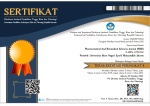The Impact of EG and DEG Cases on Sales of Over-The-Counter Syrup
Abstract
The Indonesian Food and Drug Authority (BPOM) investigated and listed safe and unsafe syrup products in response to the contamination of Ethylene Glycol (EG) and Diethylene Glycol (DEG), causing Acute Kidney Injury in pediatric patients. Unsafe products were recalled and removed from distribution, leading to uncertainty and panic among the public and significantly impacting over-the-counter syrup sales in several pharmacies. This retrospective observational study assessed the impact of EG and DEG contamination on the sales of over-the-counter syrup in Pharmacy X in South Denpasar. Data from three months before (August to October 18th, 2022) and three months following the official instruction was published (October 19th, 2022 to December 2022) were analyzed using Wilcoxon test. The findings reveal a staggering decline in the sales of over-the-counter syrup by 35,03% (p-value of 0.03). Moreover, there was a notable increase of prescriptions in powder forms. The contamination cases caused panic, resulting in changes in behavior and consumption patterns. Despite the availability of safety information on an official website, public hesitance toward syrup products persists, indicating the need to implement a more effective strategy to address misinformation and restore public trust. Each individual must be responsible for educating the public during crises to prevent the spread of misinformation, ultimately restoring trust and normal consumer behavior. Furthermore, efficient stock management should be implemented to anticipate potential health crises in the future proactively.
Keywords
References
ACIPC (2022). A Kidney Injury, the Gambia (2022). Australasian College for Infection Prevention and Control [Preprint].
Baker, S.R. et al. (2020). How does Household Spending Respond to an Epidemic? Consumption during the 2020 COVID-19 Pandemic. Review of Asset Pricing Studies, 10(4), pp. 834–862. Available at: https://doi.org/10.1093/rapstu/raaa009.
Bastani, P. et al. (2023). Acute Kidney Injury Among Children Likely Associated with Diethylene Glycol–Contaminated Medications — The Gambia, June–September 2022. MMWR. Morbidity and Mortality Weekly Report, 72(9), pp. 217–222. Available at: https://doi.org/10.15585/mmwr.mm7209a1.
Beca-Martínez, M.T. et al. (2022). Compliance with The Main Preventive Measures of COVID-19 in Spain: The Role of Knowledge, Attitudes, Practices, and Risk Perception. Transboundary and Emerging Diseases, 69(4), pp. e871–e882. Available at: https://doi.org/10.1111/tbed.14364.
BPOM (2022). Pencabutan Izin Edar Sirup Obat Produksi PT. Yarindo Farmatama, PT. Universal Pharmaceutical Industries, dan PT. Afi Farma. Badan Pengawas Obat dan Makanan, (November), pp. 1–7.
BPOM RI (2023). Penanganan Kasus Cemaran Etilen Glikol Dan Dietilen Glikol (Eg/Deg) Dalam Sirop Obat. p. 51.
Chua, G. et al. (2021). The Determinants of Panic Buying During COVID-19. International Journal of Environmental Research and Public Health, 18(6), pp. 1–28. Available at: https://doi.org/10.3390/ijerph18063247.
Di Crosta, A. et al. (2021). Psychological Factors and Consumer Behavior during the COVID-19 Pandemic. PLoS ONE, 16(August 08th), pp. 1–23. Available at: https://doi.org/10.1371/journal.pone.0256095.
Frank, B. and Schvaneveldt, S.J. (2016). Understanding Consumer Reactions to Product Contamination Risks after National Disasters: The Roles of Knowledge, Experience, and Information Sources. Journal of Retailing and Consumer Services, 28, pp. 199–208. Available at: https://doi.org/10.1016/j.jretconser.2015.08.005.
Galende, N. et al. (2022). Factors Influencing Compliance with COVID-19 Health Measures: A Spanish Study to Improve Adherence Campaigns. International Journal of Environmental Research and Public Health, 19(8), pp. 1–14. Available at: https://doi.org/10.3390/ijerph19084853.
IAI (2022). PP IAI Nomor B2-382-PP.IAI-2226-X-2022 Tentang Tanggapan IAI terhadap Kasus Gangguan Ginjal Akut Atipikal. Ikatan Apoteker Indonesia [Preprint].
Id, A.C. et al. (2020). Barriers and Facilitators of Adherence to Social Distancing Recommendations During COVID- 19 Among a Large International Sample of Adults. pp. 1–20. Available at: https://doi.org/10.1371/journal.pone.0239795.
Kemenkes RI (2020). Farmakope Indonesia Edisi VI. Direktorat Jenderal Farmasi dan Alat Kesehatan [Preprint]. 6th edn.
Kemenkes RI (2022a). Kasus Gagal Ginjal Akut pada Anak Meningkat. Kementerian Kesehatan Republik Indonesia [Preprint].
Kemenkes RI (2022b). Kewajiban Penyelidikan Epidemiologi dan Pelaporan Kasus Gangguan Ginjal Akut Atipikal (Atypical Progressive Acute Kidney Injury) Pada Anak. pp. 1–6.
Kemenkes RI (2022c). Tata Laksana dan Manajemen Klinis Gangguan Ginjal Akut Progresif Atipikal (Atypical Progressive Acute Kidney Injury) Pada Anak di Fasilitas Pelayanan Kesehatan. p. 25.
Khusna, K. et al. (2021). Pengaruh Corona Virus Disease terhadap Penjualan Produk Suplemen Kesehatan. Jurnal Farmasi Indonesia, 18(1), pp. 55–63.
Landau, D. et al. (2011). Stressful Life Events and Material Deprivation in Hoarding Disorder. Journal of Anxiety Disorders, 25(2), pp. 192–202. Available at: https://doi.org/10.1016/j.janxdis.2010.09.002.
Nurazizah, I., Emelia, R. and Listiani, W. (2021). Pengaruh Masa Pandemi Covid-19 terhadap Penjualan di Apotek Populer Farma Kota Bekasi. Jurnal Sosial Sains, 1(10), pp. 1326–1336. Available at: https://doi.org/10.36418/sosains.v1i10.213.
Sari, R.A. and Susanti, A. (2022). Analisis Keputusan Pembelian : Fenomena Masker Dan Vitamin Di Masa Pandemi. Journal of Management Small and Medium Enterprises (SMEs), 15(1), pp. 71–87. Available at: https://doi.org/10.35508/jom.v15i1.6552.
Sheu, J.B. and Kuo, H.T. (2020). Dual Speculative Hoarding: A Wholesaler-Retailer Channel Behavioral Phenomenon Behind Potential Natural Hazard Threats. International Journal of Disaster Risk Reduction, 44, pp. 1–10. Available at: https://doi.org/10.1016/j.ijdrr.2019.101430.
Viswanath, B. and Rao, O.. (2019). Factors influencing Drug Prescription Behavior of Physicians in India. The Pharma Review, pp. 57–62.
Yağar, F. and Dokme, S. (2017). Evaluation of Factors Affecting Drug Choice of Physicians. International Journal of Health Management and Tourism, 2(1), pp. 62–74. Available at: http://dergipark.ulakbim.gov.tr/ijhmt/.
Zheng, R., Shou, B. and Yang, J. (2020). Supply Disruption Management Under Consumer Panic Buying and Social Learning Effects. Omega (United Kingdom), 101, pp. 1–14. Available at: https://doi.org/10.1016/j.omega.2020.102238.
DOI: 10.15408/pbsj.v5i2.32013
Refbacks
- There are currently no refbacks.






